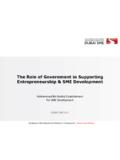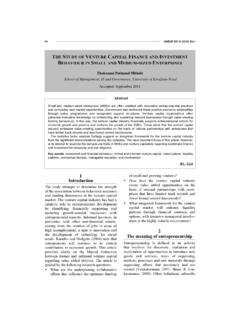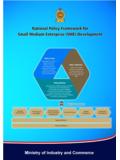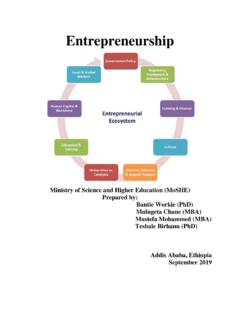Transcription of 8 ways to enhance your students’ graduate employability
1 Page 1 of 14 8 ways to enhance your students graduate employability by Dr Shelley Kinash, Director of Learning & Teaching, 26 January 2015 graduate employability means that higher education alumni have developed the capacity to obtain and/or create work. Furthermore, employability means that institutions and employers have supported the student knowledge, skills, attributes, reflective disposition and identity that graduates need to succeed in the workforce (Hinchliffe & Jolly, 2011; Holmes, 2013; Knight & Yorke, 2004; Yorke, 2006; Yorke & Knight, 2006). In the words of our Vice-Chancellor, Professor Tim Brailsford At the University-level, we remain the only Australian university to require all of our undergraduate students to complete a series of core subjects aimed at producing leaders of tomorrow equipped with the generic skills so important to a successful career.
2 The personal development opportunities offered through extra- [ and co-] curriculum activities in the form of Beyond Bond set our graduates apart. We believe that this syllabus is a world-first in terms of its Page 2 of 14 reach and structure. Beyond Bond will assist in defining the uniqueness of a Bond graduate . One of our key actions at Bond, as articulated in our Strategic Plan, is to Develop strategies to deliver superior graduate outcomes with a focus on globally relevant careers. Bond University is fortunate to have a stellar Career Development Centre that not only provides exemplar services and supports to our students, graduates and employers, but also provides sector leadership in employment development.
3 However, the Career Development Centre cannot achieve Bond University s high graduate employment targets on its own. It takes the concerted effort and collaboration of every Bond University staff member, student and graduate (in cooperation with employers) to ensure that each and every graduate achieves the highest quality graduate outcomes. Bond University Leader in graduate employability Research In December 2013, the Bond University Office of Learning and Teaching, the Faculties of Society and Design, and Health Sciences and Medicine, and the Career Development Centre were together awarded a national commissioned project grant through the Australian government , Office for Learning and Teaching.
4 In February 2015, the final report was submitted. Kinash, S., Crane, L., Judd, M-M., Mitchell, K., McLean, M., Knight, C., Dowling, D., & Schulz, M. (2015). supporting graduate employability from generalist disciplines through employer and private institution collaboration, report prepared for the Office for Learning and Teaching, Australian government . This project was commissioned by the Australian government based in part on 2013 survey data re leased by graduate Careers Australia, resulting in the key finding that graduate employability rates are the lowest they have been in twenty years. Graduates from degrees without clearly defined career pathways experienced the lowest employability rates; these degrees are humanities, computer science, life science and visual/performing arts.
5 The achieved aims of the Bond-led project were to: Page 3 of 14 achieve a greater clarity on the issues, challenges and contexts of graduate employability ; identify and review the strategies that have been successfully used to address these challenges; create opportunities for the diverse stakeholder groups to share their perspectives; and promote strategies that may be used by the various stakeholders to collaborate on improving graduate outcomes. The universities/organisations partnering in this learning and teaching research project were: Bond University (lead) James Cook University University of Southern Queensland Australian Council for Private Education and Training The Project Team was comprised of: Associate Professors Shelley Kinash and Linda Crane (Co-Leaders) Madelaine-Marie Judd (Project Manager) Professor Sally Kift (Critical Friend) Associate Professor Cecily Knight (JCU) Professor David Dowling (USQ) Kirsty Mitchell (General Manager, Bond Career Development Centre) Matthew McLean (Bond University graduate ) The project activities included: reviewing the literature.
6 Surveying students, graduates, higher education personnel and employers (705 valid surveys received); conducting in-depth interviews and focus groups (147 participants); and hosting a multi-stakeholder national graduate employability symposium (150 delegates). Page 4 of 14 Overall Results The overall findings of this project were that: there is evidence of gaps between the perspectives of students, graduates, employers and higher education personnel in how to approach the overall higher education experience for heightened employability ; multiple stakeholders stated that the most employable graduates are those who have a broad-based experience, and are able to sell their own personal identity, brand and profile; transferable skills and a broad-based student experience are more important than the particular discipline of study for impacting employability .
7 Higher education personnel (private and public) believe they can bolster graduate employability by promoting/ supporting extra-curricular and co-curricular activities and skill development (technical and transferable) through work experience, internships and placements and other types of employability strategies; students have a variety of needs, resources and capacities, such that extra-curricular and co-curricular activities and experiences may not be realistic and accessible to all; and there are barriers to employment, such as gender, ethnicity and socioeconomic background that may override employability strategies and supports. Co-curricular Activities have similarities and differences with extra-curricular activities.
8 Extra-curricular and co-curricular activities mean student recreational and/or leisure pursuits that take place outside of regular curriculum or program of disciplinary learning outcomes. These activities are pursued beyond the classroom and/or online learning. Activity examples include university sport, club/society membership and student leadership. Whereas extra-curricular activities are separate and apart from the formal Page 5 of 14 learning program, higher education institutions align co-curricular activities with formal schooling so that such activities are part of the overall learning experience. Co-curricular activities are designed to work in conjunction with the discipline curriculum to support employable graduates.
9 Key Findings regarding employability Strategies A literature review revealed empirical evidence for a positive relationship between twelve employability strategies and graduate employment. The twelve strategies in alphabetical order by the keywords are: capstone/final semester projects; careers advice and employment skill development; engaging in extra-curricular activities; international exchanges; mentoring; attending networking or industry information events; part-time employment; developing graduate profiles, portfolios and records of achievement; professional association membership/engagement; using social media/networks; volunteering/community engagement; and work experience/internships/placements.
10 Respondents from four stakeholder groups were asked to tick relevant strategies from the list in response to the respective questions: Students What strategies are you using to improve your graduate employability ? Graduates What strategies did you use to improve your employability ? Employers Which of the following strategies undertaken by students does your organisation value when recruiting graduates? Higher Education Personnel (educators & career development professionals) Which of the following employability strategies do you provide for students? Survey responses were plotted by stakeholder group. The percentage of respondents who ticked each of the listed employability strategies in response to the respective survey questions is indicated on Table One.









